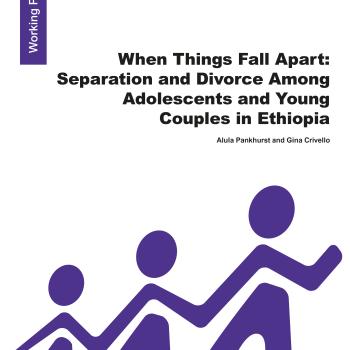
While there is rightly a major focus on child marriage, we know very little about separation and divorce among young couples, either in Ethiopia or elsewhere. How do they negotiate their relationships? What contributes to relationship breakdown? What access do they have to support and services? And what happens after they separate?
This working paper uses qualitative evidence from the Young Lives study to answer some of these questions. It is based on interviews with 59 young people from two rural and two urban locations. It examines the impacts of poverty, age, gender and location, and reflects on the implications for policy and programming. This working paper and the accompanying policy brief are part of a set of eight working papers and eight policy briefs on gendered transitions into young adulthood in Ethiopia to be published in coming weeks.

While there is rightly a major focus on child marriage, we know very little about separation and divorce among young couples, either in Ethiopia or elsewhere. How do they negotiate their relationships? What contributes to relationship breakdown? What access do they have to support and services? And what happens after they separate?
This working paper uses qualitative evidence from the Young Lives study to answer some of these questions. It is based on interviews with 59 young people from two rural and two urban locations. It examines the impacts of poverty, age, gender and location, and reflects on the implications for policy and programming. This working paper and the accompanying policy brief are part of a set of eight working papers and eight policy briefs on gendered transitions into young adulthood in Ethiopia to be published in coming weeks.

